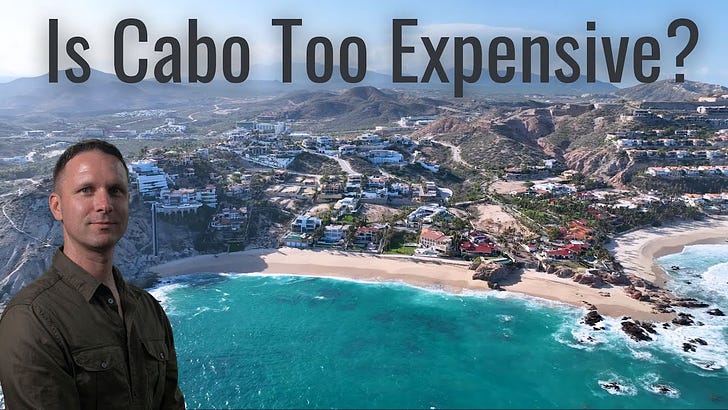Baja Property Markets Entering Uncharted Waters
Tricky Sailing Ahead for Real Estate Treasure Seekers and Bargain Hunters
With domestic financial decline and another election meltdown on the horizon, more and more Americans will be contemplating emigration, retirement or extended travel abroad.
One thing seems certain during these historically uncertain times in the Not-So-Good Ol’ USofA: an increasingly expat-curious mood will soon be sweeping the country, no matter who ends up winning the U.S. presidential election in November.
Once again pitting against each other two widely despised and wildly polarizing political figures, America’s steadily degenerating democratic process is once again guaranteeing a deeply bitter outcome for at least half the country.
That reality, combined with a progressively dicey economy – including the worst housing market in history, according to some analysts – is resulting in rippling effects felt far beyond just the continental United States.
That’s especially the case in destination-travel and leading expat-relocation locations like Baja California Sur, where the twin cyclones of American economic anxiety and political instability are battering real estate market predictability.
Cabo Price Perspectives
BCS real estate market prognosticators Fletcher Wheaton and Pedro Bulnes noted on a recent vlogcast together that while Cabo San Lucas has long been mostly known for its luxury property developments, recent trends suggest a shift may be coming. Buying and selling in what promises to be a tempestuous future will require brave new thinking, savvy risk taking and shrewd move making, they say.
Wheaton reports that real estate sales in Cabo are down by over 30%, and one reason for that beyond climbing interest rates may be its perception as an enclave for the sorta and super wealthy.
Cabo’s living costs do run high for Mexico, and chief among the reasons why is its popularity as a luxury tourist destination, Wheaton said. That fact alone is a steady upward driver of prices for vacation accommodations, restaurant dining and property sales.
But even though dollars and pesos don’t go as far in Cabo’s tourist hubs, everyday living costs can be lower than other major south-of-the-border metropolitan areas like Mexico City — and certainly under those of any number of American cities, Wheaton said.
Be that as it may, there’s no denying that Cabo flexes heavily with lavishness when it comes to homes and hotels in the resort corridor. But downturn or correction in the market could precipitate profitable opportunities for more modest developments down the road.
Wheaton and Bulnes believe that might be exactly what Cabo could use.
"Everything is catered towards the high end, and when you get to a certain point, there's not really a shortage of that," Wheaton said.
Both he and Bulnes emphasize the importance of affordable housing, with Bulnes describing it as an "infrastructure issue" essential for the region's overall economic health.
“You need affordable housing for everything else to work -- it can't all be high end developments," said Bulnes.
Efficiently buildable, utility-served zones exist that are not on the oceanfront, said Wheaton, thus making them potentially well suited to more affordable apartments, condos and community developments that could become highly desirable, delightfully livable neighborhoods.
Wheaton says affordable “workforce housing” and renovation projects on existing structures aimed at attracting vacationers and expats on more modest budgets could present up-and-coming investment opportunities.
Housing Crisis Management: Opportunities in Affordable Home Ownership Abroad
The saturation of the luxury resort market, combined with increasingly exorbitant housing costs in the U.S. and Canada, could open doors for a new generation of expats seeking more affordable home-ownership options in exotic locations.
The situation in the U.S. housing market underscores the potential appeal of BCS. Widely regarded real estate analyst Lance Lambert believes “the U.S. mortgage market is experiencing one of the biggest downturns in history.”
With average U.S. home prices up 45 percent since 2020, and an even worse situation in Canada, Wheaton says many Yanks and Canucks — especially younger would-be homebuyers — are being priced out of their domestic markets. A recent CNN survey reported that 86 percent of current renters in the United States say they can’t afford to buy a home – and less than half are confident that will ever change.
Bulnes said a lot of potential Baja land-buying and development financing by Americans is currently in limbo, and will likely remain so until after the election.
"We are kind of in this holding pattern right now," agreed Wheaton.
Irrespective of the discussions about Cabo’s cost of living, Wheaton and Bulnes say BCS in general offers a range of options for potential expat investors: the region's diverse landscapes and varied communities provide many alternatives to the higher-end Cabo market.
"Baja just has so many different ways to go," said Wheaton, highlighting the peninsula's legendary ability to cater to lifestyles, priorities and budgets of all sorts.
With its diverse offerings and affordable pricing, Baja is poised to attract a new wave of residents eager to put political bitterness and soaring costs behind them, and embrace a warmer and healthier ethos that prioritizes celebrating the moment-to-moment joy of life’s blessings.


